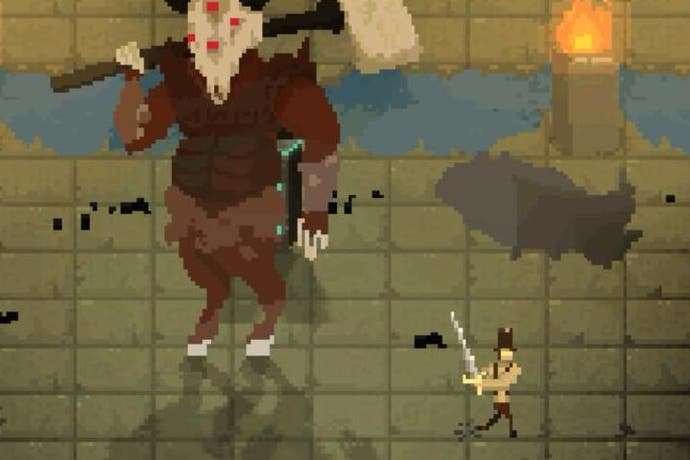EGX Rezzed 2017: Eight of the best games from the show floor
Team Eurogamer picks its highlights.
Happy final day of Rezzed! We've already had a couple of days of fascinating games, insightful talks and general fun times at what's fast becoming our favourite show of the year. We would say that, of course, given that - disclaimer time! - the event's run under the umbrella of our parent company Gamer Network, but look at our faces: we're being completely honest.
Here's a small selection of our personal picks from the show floor, though it's obviously far from a definitive list. Take it as a starting point for your adventures today, and let us know some of your own personal discoveries in the comments below.
Songbringer
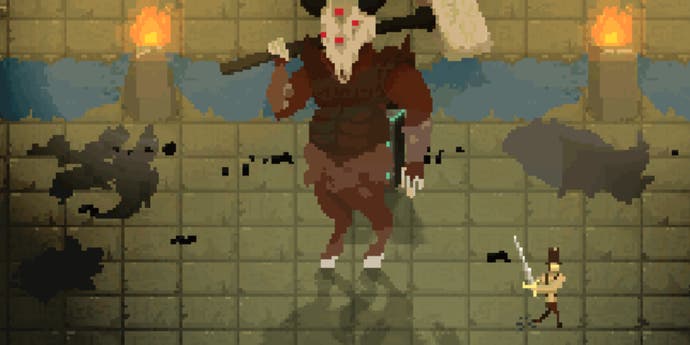
If there's one word for Songbringer, it's slick. This is the latest addition to the moody, sword-swinging, world-wandering subcategory of indies that is now leaning towards a genre of its own. Hyper Light Drifter is the obvious parallel - gritty synthwave, scorched futurescapes dripping in as much style as they are the ubiquitous three-pixel space-rain, and of course the brooding, could-be-Stephen-King's-Gunslinger protagonist with the big old sword.
But despite the rapidly shrinking scope of what can be done within that mini-genre, there is something here. Songbringer begins by having you input a six-letter code and with that, the entire world is procedurally generated - the same code will create exactly the same world, but with literally millions of combinations the option to share the world you experience with someone else is completely yours.
There is also, of course, the gameplay itself, and although the inspirations are again clear - classic Zelda (a boomerang-style top-hat, blinks, bombs, and of course the special sword are the main backbone of the kit), plus a few modern trappings - Songbringer's combat is still its own. It's slower, more contemplative than Hyper Light Drifter - but the boss battles and set pieces strewn cleverly across the randomly-generated dungeons and overworld, through the tech-magic of one-man-band developer Wizard Fu, have the potential to be hugely evocative. At the same time, the pixel art is at once typically beautiful and occasionally obstructive. It's that weird counterintuitive thing that means the game actually plays and looks better on a smaller screen, where the pixellated representations of top hats and health-restoring cacti actually work more accurately.
All you really need to know, though, is that Songbringer is an artful Zelda-esque game where you play as a space-samurai. And that sounds more than good enough. CT
EXO One
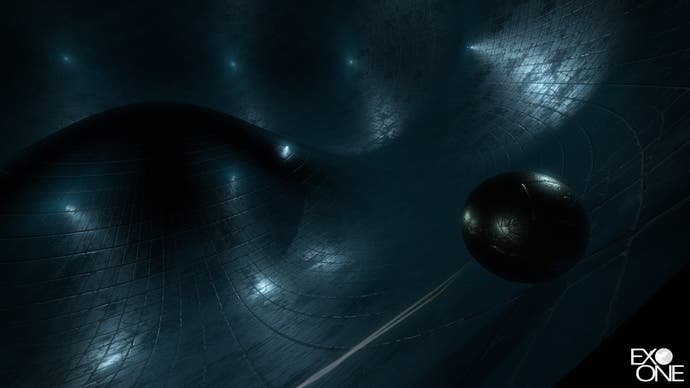
Tucked away in the Leftfield Collection, EXO One is by turns serene, satisfying and surprisingly exhilarating. Putting you in control of a spacecraft capable of transitioning from a sphere to a flying saucer, traversing the land is all about aiming for downhill slopes and using them to gather momentum. With the press of a button, you can increase the amount of gravity to which the titular spacecraft is subjected, allowing you to build up some tremendous speeds before soaring across barren yet still beautifully rendered alien worlds.
It's a traversal mechanic that takes some getting used to, but one that puts me very much in mind of Tribes - hungrily searching for even the slightest of downward inclines to help increase your momentum. It's a relaxing, almost trancelike way to play, but the payoff when you get some real speed up and go gliding up into the clouds is really something else.
EXO One is in a rough and ready state at present, but it's definitely one to watch. JC
Ooblets
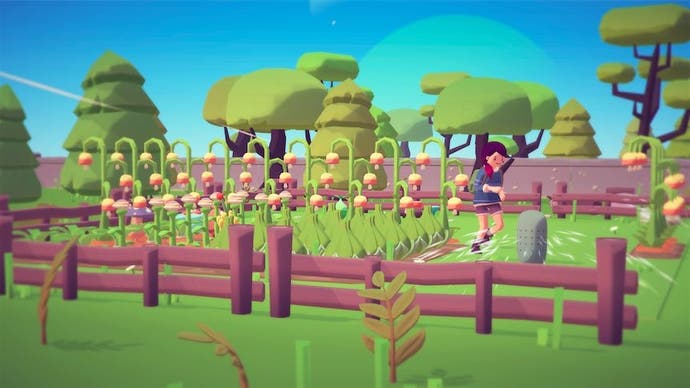
It's impossible to describe Ooblets without mentioning the inspirations which lie so clearly beneath the game's ultra twee surface. Simply put, it's like Portland, Oregon and Tumblr got together to make a Pokémon game.
Game Freak's monster battling and training are mixed with the farming and cultivating of Harvest Moon, so the plant seeds you sow turn into the creatures you raise. Even from Rezzed's limited demo, the two systems seem to mesh well. Defeating the game's cutesy plant creatures - the Ooblets themselves - earns you seeds to plant and raise into monsters for yourself. Ooblets can then grow stronger, level up, and learn new attacks.
Attack names, like everything else in the game, are cuteness turned up to 11. The first attack you learn is "Snoot Boop", where your cute little mushroom character bumps noses with a foe. A signpost pointing to your land is labelled "Farm-Farm". As you grow in power, a character remarks how you are now ready to "kick bumbum". It's unashamedly sweet escapism.
Whether it looks like your cup of tea or not, Ooblets is worth keeping an eye on. The work of two developers, it has been picked up by Double Fine and is coming to PC and Xbox One. TP
Serial Cleaner
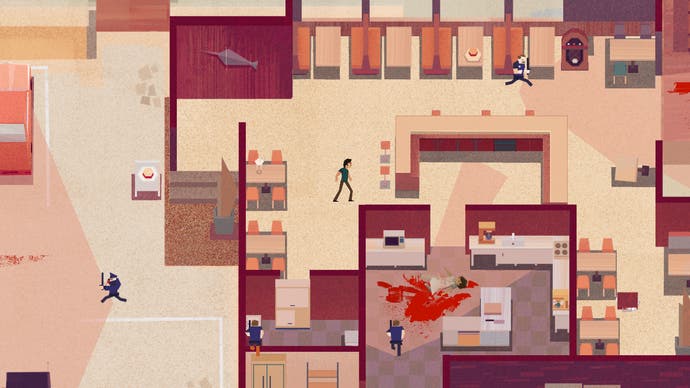
Remember expert crime-scene cleaner Mr. Wolf from Pulp Fiction? In Serial Cleaner, that's you. You are the guy deployed at murder scenes to clean up while police patrol. You watch for patterns and wait for your opportunity, grabbing murder weapons, vacuuming blood and carrying bodies to drop-off points, be it be the trunk of a car, a window - even a crocodile's mouth. Cupboards, bushes and boxes are your friends, but get caught and clubbed by a copper and you need to start the level again. Sounds grisly (there are even levels themed around serial killers) but Serial Cleaner is 1970's Miami bright, all pastel colours and plonking funk, and slick and snappy enough the trial and error core doesn't bog you down. It can be a fiendish little trickster, mind you. Serial Cleaner is quietly nestling on Steam Early Access (£7) but has a full launch - PS4 and Xbox One included - planned for the summer. RP
Scanner Sombre
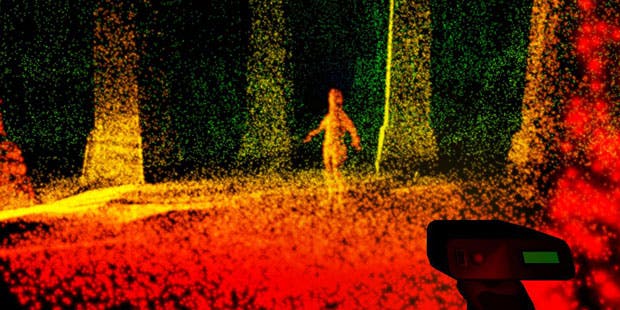
Visually akin to EGX Leftfield Collection favourite A Light in Chorus (which we'll tell you about in a bit!), Scanner Sombre is a mysterious, slow-paced stroll through pitch black caves with nothing but a particle gun to guide your way - certainly something a little different to Introversion Software's most recent work Prison Architect.
To explore, you must hold down the trigger to illuminate your empty surroundings with floating flecks of rainbow colour. It's a visually striking trick that's also your lifeline; without it you're stumbling through the dark, and what hinders your progress is your inability to illuminate the right places. The caves are a labyrinth of twisting rock, and missing an opening is easier than you think, but at least getting momentarily lost is an excuse to poke your head through the floating particles you've created, which creates a striking, snaking passage in your wake.
You can also control the aperture to focus the spray, making a faint outline of a stalagmite pin-sharp, or a old bridge reveal its missing planks so you don't fall through to the depths below. This Rezzed demo is a mechanically light but pleasing first look, with an ending that teases there might be something else with you lurking in these caverns. MR
Sonic Mania
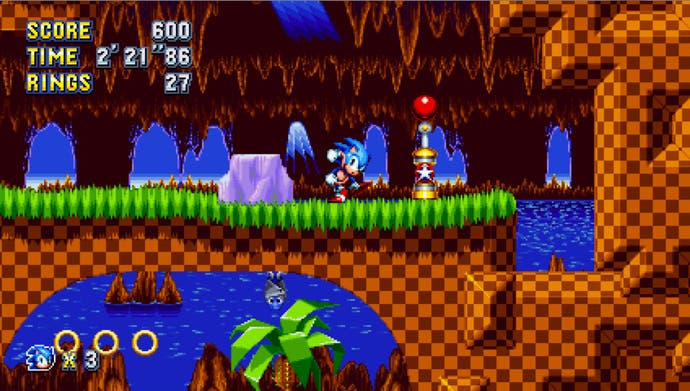
I'm not a fan of games that lean on childhood nostalgia - it's always seemed to me a fairly clumsy way of insulating your work against criticism, because dang you, it's mean to be critical of somebody's paean to their bygone youth - but I can't say enough good things about Sonic Mania. A Sega-endorsed fan remake of the 16-bit trilogy that introduces a few new stages, it captures Sonic's defining, sadly neglected play of barely controlled momentum and winding, tiered track design to a tee.
One of its new levels, Studiopolis Zone, is a wonderful extension of the classic Sonic conceit of being stuck inside a massive, gaudy, lethal machine, equal parts pinball table and slaughterhouse conveyer belt. There are some lovely little flourishes, like clumps of balloons that sway when you bounce off them or metal flies that swoop down to flash-photograph you, like paparazzi descending on the red carpet. There's also a new move, the drop dash, that lets you insta-propel yourself into a sprint on touchdown if you're confident you can handle the unseen layout ahead. It's evidently the work of extremely talented artists, designers and programmers who know the Sonic games inside out and back to front. ET
A Light in Chorus
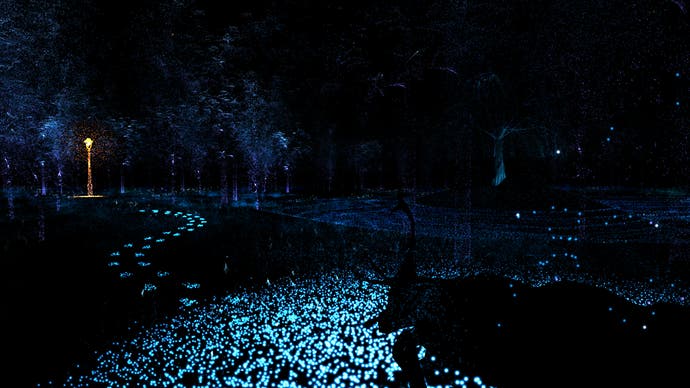
A Light In Chorus is a wondrous first-person adventure in which you rove a fallen Earth visible as swirls of coloured particles, recreating objects and scenes with the aid of the Golden Record, an archive of human data carried beyond our solar system by NASA's Voyager probes. I'm studying the Golden Record for my doctorate, as it happens, so was always going to find the idea fascinating, but you don't need to be a NASA buff to enjoy the act of repairing a half-recognisable landscape by shifting the needle on a holographic LP player, emitting tones that correspond to the object under scrutiny. Most mysterious of all is the identity of the character you're playing - a literal visitor from another planet, whose nature is hinted at by the game's mechanisms of perception and interaction, or something more oblique? I'm looking forward to investigating further. ET
Vostok Inc
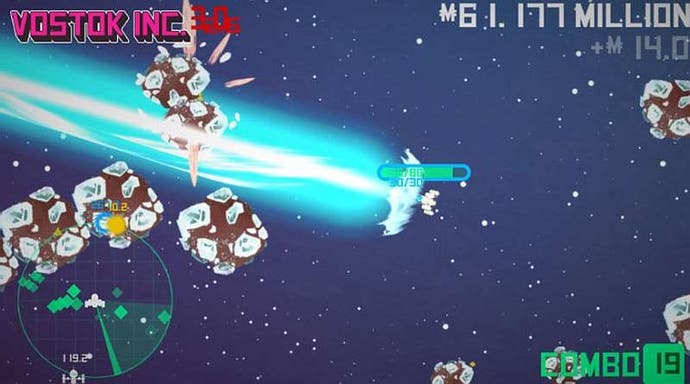
This was the only game on the Rezzed show floor where the dev appeared to be pitching it directly to a Eurogamer staffer. Granted, that staffer wasn't me - "I reckon Donlan would love this," said Nosebleed Interactive's Andreas Firnigl. I reckon he's right, and Donlan still being on sabbatical, I felt his tastes should be represented here. Plus, Vostok Inc. is clever and fun and full of witty touches.
It's a twin-stick shmup married to the exponential metagame of 'idle clickers' like Cookie Clicker. You're both a daring starship pilot and a rapacious space capitalist; you mine, terraform and colonise planets to make more money to mine, terraform and colonise more planets - plus fund your blasting and upgrades for your rocket. I liked the managers you could recruit, each of which came with a Tamagotchi-style minigame that would keep them happy and productive, and the crazy weapon upgrades enabled by mixing and matching permutations of three basic, upgradeable weapon types. Perhaps it's not one for pure arcade fanatics, but it's a game with a great sense of humour about the base motivations of game design itself. OW
Written by Chris Tapsell, Johnny Chiodini, Tom Phillips, Robert Purchese, Matt Reynolds, Edwins Evans-Thirlwell and Oli Welsh
